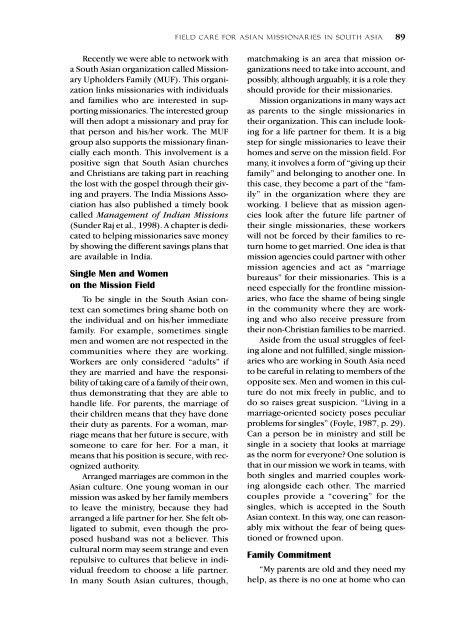Part 2 Regional Issues and Insights - World Evangelical Alliance
Part 2 Regional Issues and Insights - World Evangelical Alliance
Part 2 Regional Issues and Insights - World Evangelical Alliance
You also want an ePaper? Increase the reach of your titles
YUMPU automatically turns print PDFs into web optimized ePapers that Google loves.
field care for asian missionaries in south asia 89<br />
Recently we were able to network with<br />
a South Asian organization called Missionary<br />
Upholders Family (MUF). This organization<br />
links missionaries with individuals<br />
<strong>and</strong> families who are interested in supporting<br />
missionaries. The interested group<br />
will then adopt a missionary <strong>and</strong> pray for<br />
that person <strong>and</strong> his/her work. The MUF<br />
group also supports the missionary financially<br />
each month. This involvement is a<br />
positive sign that South Asian churches<br />
<strong>and</strong> Christians are taking part in reaching<br />
the lost with the gospel through their giving<br />
<strong>and</strong> prayers. The India Missions Association<br />
has also published a timely book<br />
called Management of Indian Missions<br />
(Sunder Raj et al., 1998). A chapter is dedicated<br />
to helping missionaries save money<br />
by showing the different savings plans that<br />
are available in India.<br />
Single Men <strong>and</strong> Women<br />
on the Mission Field<br />
To be single in the South Asian context<br />
can sometimes bring shame both on<br />
the individual <strong>and</strong> on his/her immediate<br />
family. For example, sometimes single<br />
men <strong>and</strong> women are not respected in the<br />
communities where they are working.<br />
Workers are only considered “adults” if<br />
they are married <strong>and</strong> have the responsibility<br />
of taking care of a family of their own,<br />
thus demonstrating that they are able to<br />
h<strong>and</strong>le life. For parents, the marriage of<br />
their children means that they have done<br />
their duty as parents. For a woman, marriage<br />
means that her future is secure, with<br />
someone to care for her. For a man, it<br />
means that his position is secure, with recognized<br />
authority.<br />
Arranged marriages are common in the<br />
Asian culture. One young woman in our<br />
mission was asked by her family members<br />
to leave the ministry, because they had<br />
arranged a life partner for her. She felt obligated<br />
to submit, even though the proposed<br />
husb<strong>and</strong> was not a believer. This<br />
cultural norm may seem strange <strong>and</strong> even<br />
repulsive to cultures that believe in individual<br />
freedom to choose a life partner.<br />
In many South Asian cultures, though,<br />
matchmaking is an area that mission organizations<br />
need to take into account, <strong>and</strong><br />
possibly, although arguably, it is a role they<br />
should provide for their missionaries.<br />
Mission organizations in many ways act<br />
as parents to the single missionaries in<br />
their organization. This can include looking<br />
for a life partner for them. It is a big<br />
step for single missionaries to leave their<br />
homes <strong>and</strong> serve on the mission field. For<br />
many, it involves a form of “giving up their<br />
family” <strong>and</strong> belonging to another one. In<br />
this case, they become a part of the “family”<br />
in the organization where they are<br />
working. I believe that as mission agencies<br />
look after the future life partner of<br />
their single missionaries, these workers<br />
will not be forced by their families to return<br />
home to get married. One idea is that<br />
mission agencies could partner with other<br />
mission agencies <strong>and</strong> act as “marriage<br />
bureaus” for their missionaries. This is a<br />
need especially for the frontline missionaries,<br />
who face the shame of being single<br />
in the community where they are working<br />
<strong>and</strong> who also receive pressure from<br />
their non-Christian families to be married.<br />
Aside from the usual struggles of feeling<br />
alone <strong>and</strong> not fulfilled, single missionaries<br />
who are working in South Asia need<br />
to be careful in relating to members of the<br />
opposite sex. Men <strong>and</strong> women in this culture<br />
do not mix freely in public, <strong>and</strong> to<br />
do so raises great suspicion. “Living in a<br />
marriage-oriented society poses peculiar<br />
problems for singles” (Foyle, 1987, p. 29).<br />
Can a person be in ministry <strong>and</strong> still be<br />
single in a society that looks at marriage<br />
as the norm for everyone? One solution is<br />
that in our mission we work in teams, with<br />
both singles <strong>and</strong> married couples working<br />
alongside each other. The married<br />
couples provide a “covering” for the<br />
singles, which is accepted in the South<br />
Asian context. In this way, one can reasonably<br />
mix without the fear of being questioned<br />
or frowned upon.<br />
Family Commitment<br />
“My parents are old <strong>and</strong> they need my<br />
help, as there is no one at home who can
















